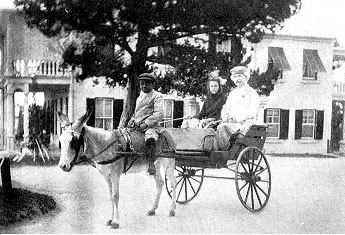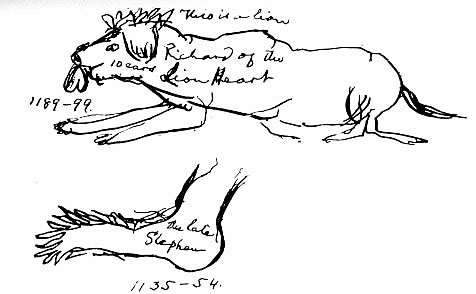

HOW HISTORY MAY BE TAUGHT
 |
|
They jogged off down the road.
|
THAT afternoon Margaret went with Mr. Clemens in the donkey-cart. I saw them start, or, rather, try to start. For Maude was stubborn and it took some time to persuade her to move. Maude was diminutive in size, but the amount of obstinacy she possessed would have fitted out a mastodon, nicely. She was always attached to a small cart, and early every morning she was at her post in front of the hotel. She showed perfect indifference as to whether she went or came. Of course, she preferred a stationary attitude. Reginald was her guardian angel -- a black little islander who enjoyed the distinction of being the only human being who could make Maude go. Later, Mr. Clemens discovered that he was also absolutely joke-proof. As Mr. Clemens, Margaret, Reginald, and Maude finally jogged off down the road and disappeared at the turn, I felt a little lonely for my young playmate, and possibly a little envious. Why couldn't I, too, have been really twelve years old? The next morning after breakfast Margaret's loyal soul could no longer endure the strain of divided affections. She brought Mr. Clemens over to me and said: "You mustn't be rivals, and I want you to know each other." We said we would try to bury our hatred.
 |
|
The history lesson. Facsimile of Mark Twain' sketches.
|
In the happy weeks that followed, the Mark Twain of Roughing It and of Innocents Abroad, of Tom Sawyer and of Huckleberry Finn, became Mr. Clemens of the Happy Island, and his companionship in gentle excursions, along peaceful, shady roads, was even more delectable than when he had led us over western plains or on European jaunts. In the delight of knowing Mr. Clemens we almost forgot Mark Twain. This charming, courteous gentleman, with the crown of silver hair, with his immaculate white clothes, his kindly deference of manner, his ready thoughtfulness, and his sweet affection for children, was sufficient in himself to win any one's heart, without the prestige of the other name. I think it was the next morning after the meeting of the rivals that the history lessons began. We were at breakfast, and from our table I could see both Mr. Clemens and Margaret. I noticed Mr. Clemens writing for a while quite busily. Then he called the saturnine head waiter and gave him a card, with instructions. The unsmiling messenger took the card and carried it over to Margaret. She looked at it and nodded back smilingly at Mr. Clemens. The mystery was solved after breakfast when Margaret brought me the card, on which was inscribed her lesson in history. Mr. Clemens followed the pictorial method, and he used ingenious devices for fixing the length of a king's reign. For instance, on this particular card he wished to represent William the Conqueror. He had drawn a grotesque figure made with eleven legs and ten arms, which meant that he had reigned twenty-one years. Could there have been anything more lucid? After breakfast, when he met Margaret, he asked her in his gentle drawl: "Margaret, how many arms and legs did William have?" Upon her replying promptly, "Twenty one! " he said, "Extraordinary, wasn't it, dear? Extraordinary!" These history lessons continued with regularity, to our great delight. I remember that Stephen was a huge foot with nineteen toes. Henry II was a head with a mouth made like this: $ -- 35 --$. Richard the Lion Hearted was a lion. Half of him was drawn on one side of the card, with "over" written underneath, and on the reverse sprawled the last half of him. In his mouth was a heart, and, dangling from it, a card bearing the dates 1180-1199. The dining-room was a large light room overlooking the sea. The meals were leisurely to the last degree, and it was a very nice place in which to make informal calls. Mr. Clemens was rather abstemious, and when he had finished earlier than the rest of us he would often come over to our table and talk. His whimsical way of putting things, his deep knowledge of human nature, his half-pessimistic philosophy, his kindly toleration, in most things, made everything he said so precious that we did not want to lose a word. The morning after we had heard of the assassination of the King and the Crown Prince of Portugal he came over and sat down, and the conversation naturally turned on that topic. "Did you ever realize," he said, "how awfully difficult it is to kill a king? Think how many times it has been tried, and how often it fails! They tried it eighteen times on Henry IV, many times on Queen Victoria, and we don't know how many countless times on the Emperor of Russia. Will those anarchists never learn that when the heart is filled with hate the hand that aims the weapon will surely tremble!"
From this we went on to speak of certain common traits of the human race, and Mr. Clemens launched forth on a tirade against the general asininity of us all. Hysterical hero-worship and the fickleness of public favor were touched upon. Mr. Clemens grew eloquent and took as a symbol a temporary triumphal arch -- one built for a popular hero. "It was made of staff and plaster because the people hadn't time, they hadn't time [I can still hear the insistent nasal drawl which gave such a world of meaning to these words] to build a more enduring token. They would build it in marble, later -- yes, later, when they had more time! The plaster arch crumbled away, but later, when they had time, there was no hero to whom to build the enduring arch."
We happened to mention the description of the Bander-log in the Jungle Book as one of the best satires ever written on the human race. This gave Mr. Clemens another text, upon which he grew wonderfully eloquent. Yes, we were all Bander-log, and the biggest Bander-log of all was whoever sat in the executive chair of the nation. He wondered why the Almighty had ever created us. It was bad enough to have concocted the house-fly, or to have imagined rats and mice, but the Bander-log was the crowning mistake. And then, to conceive of the idea that this same Almighty who had created us wanted to have our company through all eternity! He laughed gently as he finished his blasphemous tirade, and, looking at the Lady Mother, who wore a slightly puzzled expression, he added: "Now, you must forget all that I've said, and if the Recording Angel brings this up against me I shall simply tell him that I never said anything of the sort, that it was those W_____ s who were talking!"
Return to book index
Proceed to next chapter (Chapter Three)